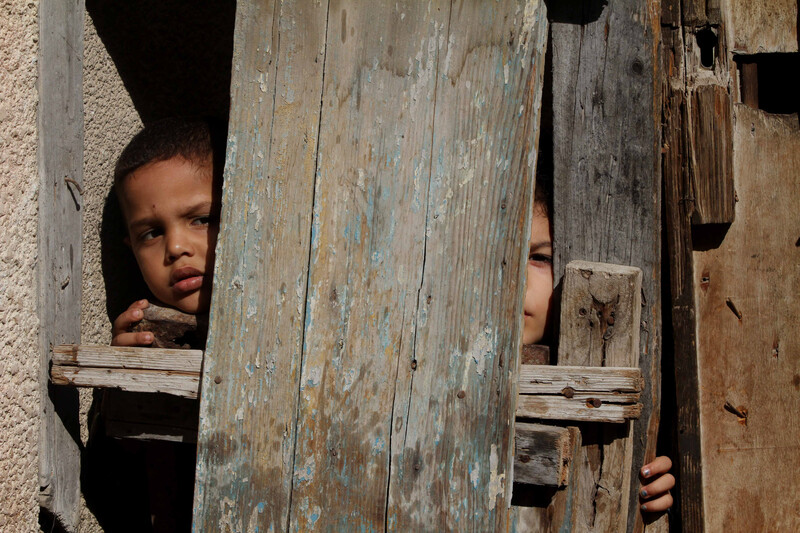The Electronic Intifada Podcast 9 November 2012

Palestinian children in the Shati refugee camp, Gaza, 3 November. PA leader Mahmoud Abbas renounced refugees’ right of return last week, sparking outrage.
APA images“We are … very grateful to be given the opportunity to be part of the international Palestine solidarity movement, because … it really allows us to relive our history in this struggle. It allows us to remember our own heroes.” - Muhammed Desai of BDS South Africa
This week on The Electronic Intifada podcast:
- An important victory for civil rights as Palestinian-American Muhammad Salah is removed from the US Treasury Department’s “terrorist” list after a lawsuit challenge;
- Following Palestinian Authority president Mahmoud Abbas’ renunciation of refugees’ rights, Palestinians take to the streets and are beaten and attacked by Abbas supporters, we’ll feature excerpts of several responses to Abbas’s declaration from our correspondents;
- Travel restrictions between the West Bank and Gaza tighten, separating families and spouses;
- News from the global boycott, divestment and sanctions movement including an interview with Muhammed Desai of BDS South Africa about the current boycott campaigns and solidarity initiatives between South Africans and Palestinians; and more.
Rush transcript: Muhammed Desai of BDS South Africa, 9 November 2012
The Electronic Intifada: Talk about the significance of the ANC’s support of the Palestinian-led BDS movement and maybe talk about the work by activists in South Africa that has gotten the ANC to this position.
Muhammed Desai: In many ways, being South African puts one in a very privileged, but also difficult, position. South Africans carry this moral weight, which at times is a privilege, but it also [is] a responsibility — a responsibility that we carry with a lot of pride, but at the same time it is a responsibility, because we were the recipients. We were the recipients of international solidarity on a scale that has never been seen before. We were the recipients of the people mobilizing on the streets of the world in the hundreds of thousands, if not in the millions.
And it’s this international solidarity that we are beginning to appreciate even more as we are partaking in Palestine solidarity work. And I think this shift within the ANC to become even more vocal on the issue of Palestine is really a reliving of the ANC’s own experience in the 1980s when it relied on international solidarity.
So in some ways, we are in fact very grateful to be given the opportunity to be part of the international Palestine solidarity movement, because as I said, it really allows us to relive our history in this struggle. It allows us to remember our own heroes, such as Oliver Tambo or Archbishop Desmond Tutu. But we remember them in a very practical way, we remember them in a very strategic way: what would Oliver Tambo have done in this situation? How would Archbishop Desmond Tutu have responded to this situation?
So this sense of internationalism is something that is taking a solid grasp within the ANC. We’re seeing a sense of internationalism reside within this movement, that previously had a very strong sense of internationalism but it may have decreased since the ANC came into power. But Palestine solidarity is allowing members of the ANC but also South Africans more generally to deal with that internationalism.
EI: Muhammed, can you talk about the growth of the BDS movement specifically in South Africa, and talk about some of the current campaigns that BDS South Africa has taken on and some of the successes you’ve enjoyed so far.
MD: Well, embarrassingly so, we actually learned from the international community. There was a lot of rhetoric from South Africa in the past about solidarity with the Palestinian people and about championing the boycott, but we’re really taking our lead from people who have set the ground[work] overseas. So there are a few strategic campaigns we have. For example, there is the campaign against Ahava, which is an international campaign, the campaign against Sodastream which again is an international campaign.
The reason why I raise this is also because we gain a lot of strength, knowing that there are people in other countries who are involved in similar campaign activity. But other than the strategic campaigns in which we are trying to achieve a victory in the shortest amount of time, there are also larger, broader campaigns, more long-term campaigns that we are running.
Because really, this boycott, divestment and sanctions [movement] but also Palestine solidarity must live beyond those few individuals, it must live beyond the main organizers. And the only way that we make sure that it lives beyond the one or two people is to create a mass movement. A mass movement that will keep Palestine solidarity safe in this country, beyond just the spokespeople or the chief coordinators, et cetera.
So those are the two sorts of campaigns that we are engaged in, but also something new that has come up in South Africa. And that is a group of progressive Jewish people that have come out in public support of the Palestinian struggle, but also specifically in support of the boycott, divestment and sanctions campaign. And why it’s good for South Africa is because the Jewish community in South Africa for the most part is very supportive of Israel. So for this small group for Jewish people to break out of that, it’s creating a lot of good shockwaves in the country, where the Israel lobby cannot continuously frame this issue as a religious issue; they cannot continuously frame this issue as one that is attacking Jewish people.
EI: How can people learn more about the work that BDS South Africa is doing, and how can people get in touch?
MD: We’re urging people to join us on Facebook and on Twitter, both with the handle BDSSouthAfrica, and also people can visit us on our website, www.bdssouthafrica.com.





